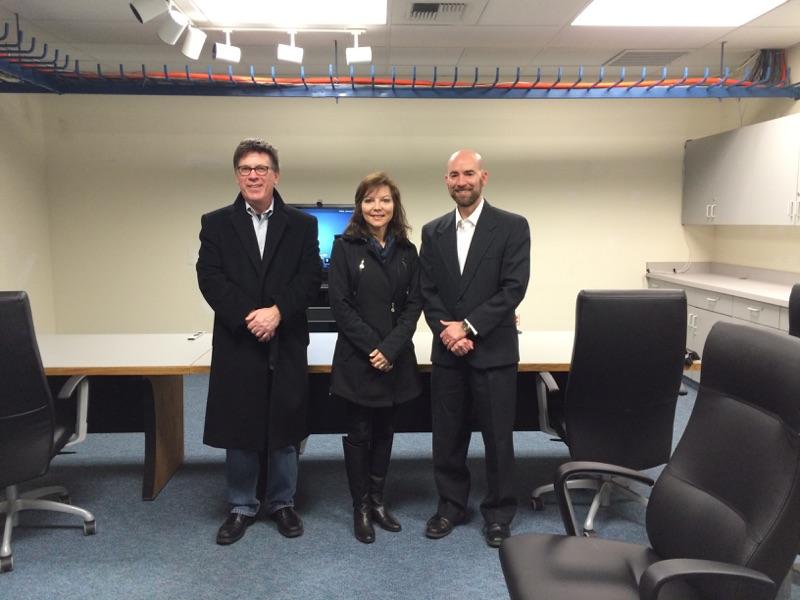The Senate Facilities and Operations Committee has officially adopted rules for the use of remote testimony during the 2015 Legislative Session. As adopted by the F&O Committee:
SENATE REMOTE TESTIMONY PILOT PROJECT
As part of the effort to expand opportunities for citizens across the state to provide testimony from remote locations, the Facilities & Operations Committee has adopted the following strategy to be used while expanding remote testimony under a pilot project. The current use of videoconferencing used to facilitate expert, invited testimony is to be expanded to include public testimony. The expansion shall be within current IT resources and capabilities and, on a case-by-case basis, via use of college, university or Educational Service District facilities with which the Senate has an established relationship or other such facilities that can be scheduled without additional costs. During this pilot phase, Senate support of remote testimony must necessarily be limited in terms of funding and staff resources.
For the public:
Persons wishing to testify remotely before a Standing Committee on proposed legislation being considered by the Committee are required to notify Senate Committee Services at least 48-hours in advance of the scheduled hearing. Committee and IT staff will coordinate with the public to facilitate the remote testimony.
For Standing Committees:
Standing committees who wish to receive testimony from remote locations will:
- Submit requests to Susan Howson, Director of Senate Committee Services and Brad Hendrickson, Staff Coordinator, by the Wednesday prior to the week of any proposed videoconference;
- In the case of scheduling conflicts, priority will be given to Committees that have yet to utilize remote testimony otherwise it shall be given on a first requested, first served basis; and
- Remote public testimony will only be received from nonpartisan sites.
- During the 2015 session, remote testimony locations dedicated solely to Senate use will not be established; and
- During the 2015 session, clerks based at a remote location to support remote testimony will not be retained;
For the Facilities & Operation Committee:
- Expend no more than $15,000 to support remote testimony during the 2015 session;
- Utilize no more than 120 combined staff hours during the 2015 session;
- Interview or survey Chairs, ranking members, those who testified remotely, remote location personnel (e.g., SBCTC, colleges, ESD’s) as well as SCS staff, and A/V technical support staff at LSS and LSC about their remote testimony experience during session; and
- Report findings and conclusions to F&O after the conclusion of the 2015 session on at least the following:
- The specifics of how this service was used (which committees, nature of testimony, length of times);
- Costs to Legislature and other entities;
- Amount of staff time required (Legislature and others);
- Remote locations used;
- Logistics challenges such as staffing, equipment, scheduling;
- Evaluations and recommendations by all parties participating in providing and using this service; and
- Recommendations for future legislative sessions.
I spoke with Brad Hendrickson this morning to better understand the rules and he said they essentially provide two different ways for remote testimony to be used during 2015:
- A Chair identifies a bill/hearing that they want to allow remote testimony on; or
- A citizen contacts Senate Committee Services (SCS) with at least 48hrs notice that they wish to provide remote testimony and then SCS coordinates with Chair to see if the option will be provided.
The goal is eventually to create a remote testimony request form on the Legislature's website like Colorado is currently doing for its new remote testimony option. The hope is that when the official committee hearing agendas go out each Wednesday for the next week those subject to remote testimony will be indentified.
Currently only the Senate is providing a remote testimony option for Washingtonians.
Last Friday I had the opportunity to test using remote testimony from Columbia Basin College (CBC) in Tri-Cities with Sen. Brown and CBC President Richard Cummins (see pic).

As noted by Sen. Brown in her recent session email update to constituents, the test went great and she plans to conduct a work session focused on STEM education live from the Tri-Cities on February 4th:
The legislative session is already busy, which is why it’s more important than ever that I hear from you on the issues you are concerned about. Unfortunately, one of the best ways of voicing your opinion – testifying at public hearings – is often too difficult for folks east of the Cascades.
That’s why I have been working with Jason Mercier of the Washington Policy Center, other lawmakers and President Richard Cummins at Columbia Basin College on a plan to allow remote testimony – meaning people can speak directly to a legislative committee without traveling to the Capitol.
I’m happy to report that a test of the system went extremely well and, as a result, we will now be holding a work session with public testimony live from the Tri-Cities. The Delta High group will speak Feb. 4 before the Trade and Economic Development committee on the importance of science, technology, engineering and math education.
CBC President Richard Cummins is an enthusiastic supporter of remote testimony and has gone above and beyond to facilitate its use at the college. Along with setting aside a dedicated room for its use, Cummins is already thinking about ways to give students credit for staffing the hearings. He told me:
I hope we are able to not only create access to government for eastern Washington folks, but also develop meaningful experiences for our students who are interested in government, policy development, and leadership. How cool would it be to do a remote internship for a Senator or testify on issues such as tuition?
Washington's remote testimony efforts are starting to receive national attention. As noted by Government Executive:
In the histories of many states, the sites for capital cities were often selected because of their geographic centrality—think Columbus, Columbia or Indianapolis, just to name a few.
Having a central location not only reduced the travel burdens for state lawmakers who represented far-off districts but also made it easier for their constituents to reach the seat of state government.
But transportation and communication technologies have changed over time. And these days, a good question to ask is: What if constituents didn’t need to travel to the state capital to offer live testimony before legislative hearings?
Enter the concept of 'remote testimony.' It’s not necessarily new or revolutionary, but many states have experimented with ways to break down the physical barriers of connecting their constituents with lawmakers.
This is a very exciting time. Of course, the ability for citizens to take advantage of remote testimony will only be as good as the public notice of a hearing and details of a bill to begin with. This is why also enacting legislative transparency reforms like those proposed last year by HB 2369/SB 6560 should be considered.




